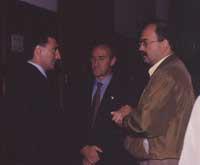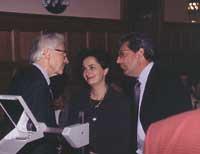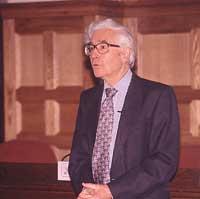Chatting with Antony Hewish
Chatting with Antony Hewish

Elhuyar-Zetiaz: When you started your research work, in the early 1940s, we knew little about the origin of the universe. Now all schoolchildren know the Big Bang. How has the vision of the universe changed in the last 50 years?
Antony Hewish: The truth is that it has been a revolution. As you said, when I started working we knew nothing about the origin of the universe and now we are discussing what happened in the first second of its creation. Those of then were only mathematical speculations, now we know the physical realities. We can say that we are in the golden age of astronomy without problems.
ZETIAZ-Elhuyar: You are one of the pioneers of radio astronomy. What is radioastronomy?
Antony Hewish: Until the 1940s, the study of the sky was limited to optical telescopes. Radio astronomy began after the war. The phenomenon was discovered at random. In 1942 the radars of southern England were sharply interfered. At first they thought that these interferences were due to the enemy, but immediately they realized that what was happening was more important than that: The interference was due to radiofrequency radiation emitted by the Sun.
Therefore, the Sun emitted radio signals and, pulling it, it was known that other celestial objects also do. Thanks to this unexpected discovery we were opened a new window to study the sky and the universe. From then on the sky map would not only be made with light, but radio waves would also be used for that task.
ZETIAZ-Elhuyar: What is the main contribution of radio astronomy to the knowledge of the universe?

Antony Hewish: I would mention two. First, locate the radiogalaxias, that is, those that emit radiation in the radiofrequencies. This occurred around 1951 when it was observed that these radiogalaxias were 100 times above the farthest objects that were then known. Therefore, it was proven that the radiation obtained from them was very distant in time. The first conclusion is very important: radiogalaxias showed us that it was possible to study how the universe was in ancient times. It was the first step to start thinking that the universe could be the origin of this discovery.
The second, and perhaps the most decisive, was made in the late 1960s, when it was discovered that radiation was emitted in the microwave field from all corners of the universe. This is called microwave background radiation. This radiation was associated with the initial explosion of the Big Bang, which was regarded as its footprint and decisive for the approval of the theory of the initial gigantic explosion.
ZETIAZ-Elhuyar: What is the main problem of astronomy today?
Antony Hewish: Undoubtedly, the main challenge of astronomy today is to know how galaxies and galaxy sets were formed. We know stars quite well, we know how they are created and their development is also known. We don't know much about the origin of galaxies. How they are formed, why groups of galaxies are formed, what models of organization exist, etc. are unanswered questions for the moment. But they are not despicable. In short, behind all these questions is one of the most important challenges of knowledge: knowing how the structure of the universe has been formed. As mentioned above, astronomy has undergone a great revolution in recent decades. We know more and more about the universe, but in reality we still know almost nothing.
ZETIAZ-Elhuyar: Does God have a place in the universe?
Antony Hewish: From my point of view yes. Scientific knowledge allows us to answer the question “how”; “how” this happens or “how” it develops. However, we still have an important question outside the influence of science: why. People wonder why we are here, but science will not give us an answer and the bet can be sought in religious feelings. You have to have a scientific and religious view of the world and I don’t think the two are in conflict. One needs another to get satisfactory explanations.
ZETIAZ-Elhuyar: A well-known project of radioastronomers is SETI, the search for intelligence of other planets among the radio waves of the universe. Do you think it will have results?

Antony Hewish: I think it will have a negative result. I'm not against this line of research, but I don't know well to invest too much in it. If people are prepared and use some of the time on radio telescopes, it's okay, but it wouldn't make it a priority. What do we know about communication channels that would use more advanced intelligence? If we are good at radio communication, do they also have to be like that? Why won't they use X-rays or Gamma? We have no clues as to how their technology is, the belief that they will use radio waves has no basis. If today someone takes a big branch and starts to hear the sound coming from outside, it would be considered crazy. Higher intelligences may also consider it insane that we search the radio waves.
ZETIAZ-Elhuyar: Are we alone in the universe?
Antony Hewish: I have an open view on this. I would not be surprised that life was born elsewhere in the universe, or was born anywhere else. I have been able to know SETI programs closely thanks to my work, but I am not the driver of them.
ZETIAZ-Elhuyar: How do I know the debate between applied research and basic research?
Antony Hewish: I believe that in an institution like Cambridge one would have to do pure research. If we don't do pure research, if we don't follow curiosity, we won't learn more about the universe. Without basic studies, we will not make discoveries that imply an advance of civilization. Without faraday we would not have electricity today, we would have a wonderful popcorn of oil. Communications and radio waves… Without basic research we wouldn’t have had any of that. I think the research aid of pure curiosity is down, at least in my country, and it is not good. Politicians who chronicle spending want immediate applications, but basic research is not so, perhaps it never has it or will have it within 10-15 years. Balance must be maintained and the university must be the place of research.
Buletina
Bidali zure helbide elektronikoa eta jaso asteroko buletina zure sarrera-ontzian











